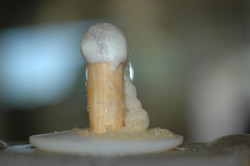 First, beer. Tomorrow a New York Times tasting panel will report back on porters. Eric Asimov writes in advance he “was impressed with the high quality of porters available today.”
First, beer. Tomorrow a New York Times tasting panel will report back on porters. Eric Asimov writes in advance he “was impressed with the high quality of porters available today.”
Second, wine. In his blog, The Pour, Asimov writes today about what winemakers are really saying when they describe themselves as “non-interventionist” – pretty important if we are to accept the concept of terroir. The post was provoked by an interview he did with the Michael Rolland, the flying winemaker villified in the movie “Mondovino.”
In it Asimov mentioned the names of some California winemakers who favor moderation when it comes to the balance between restraint and fruit bomb. Rolland replied:
“Are they as successful in the marketplace? No,” he said, warming to the subject. “Wine is done for what? The public! Wine is a business. They want to make wine to sell wine. In the U.S. they are honest enough to tell you they want good ratings. They don’t want loser wines.”
Now, back to beer. Asimov’s post could lead to a discussion of why bigger, bolder beers get so much more attention than classically restrained beers (Double IPAs vs. a German hell from a countryside brewer, but not here, not today.
Instead, consider the statement “Wine is a business.” Now replace the word “wine” with “beer.” We simply have to accept that. Beer is business, but – here’s the good part – it can be more.
Asimov’s post sent me to the bookcase to pull out a copy of Beer Naturally, co-produced by the Campaign for Real Ale (CAMRA) in 1976. Primarily a book of loving, mostly black-and-white, photos – hops twine being strung, vines, harvesting of barley, floor maltings, well-worn kettles – the book illustrates how beer can be brewed naturally while also acknowledging the ways brewers break with tradition.
But the strongest message is the photos and the first words of the book:
“Beer at its best is a reflection of a golden field of barley, a reminder of the rich aroma of a hop garden. Scientists can argue endlessly about the merits of the man-made concoctions which go into much of today’s beer but the proof of the pint is in the drinking … the best of British beer is produced from the gifts that nature gave us and by methods which have been proudly handed down over the centuries. The story of beer is a story of nature and of craftmanship; a story of farmer and brewers who join forces to greate beer naturally.”